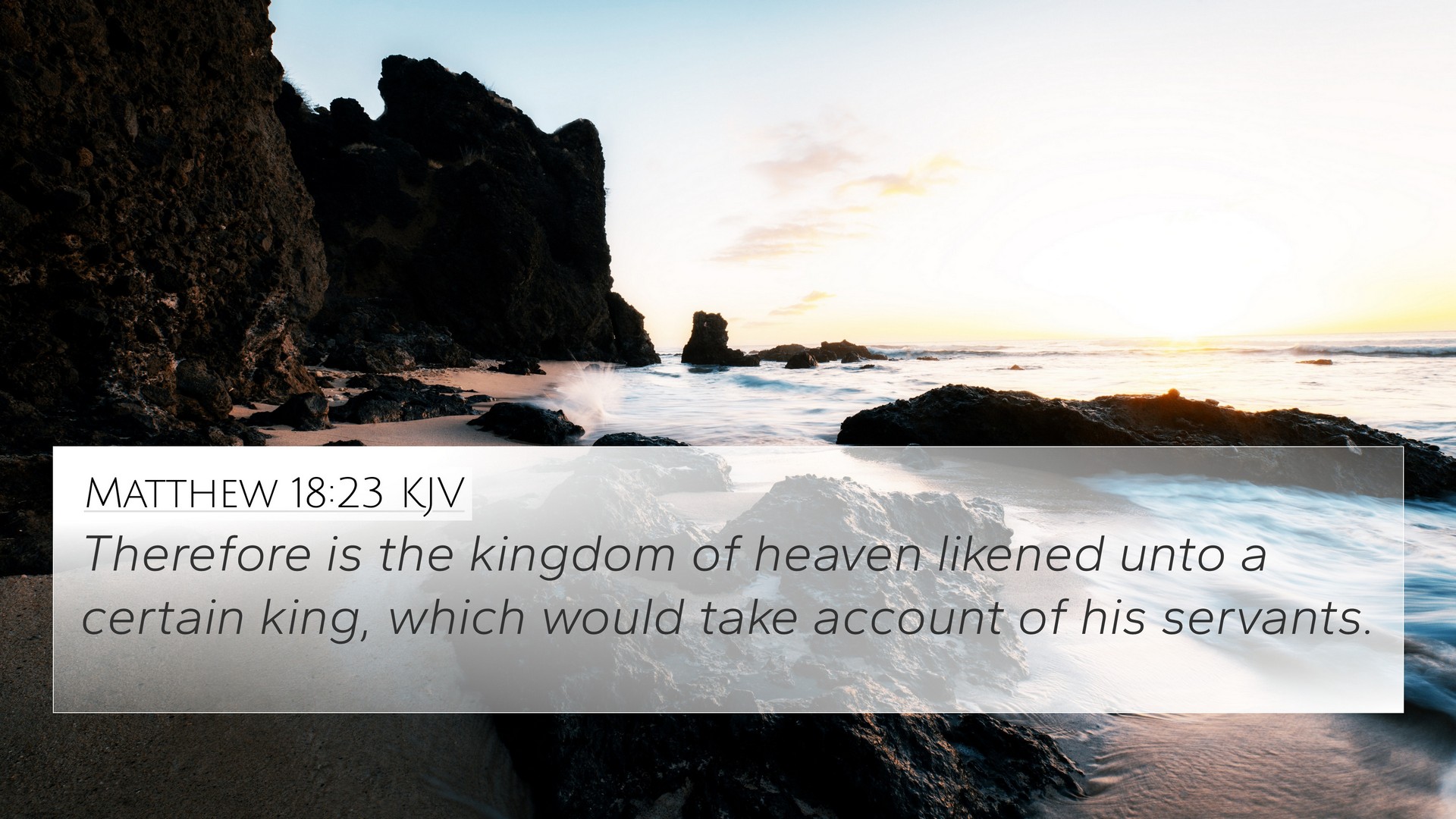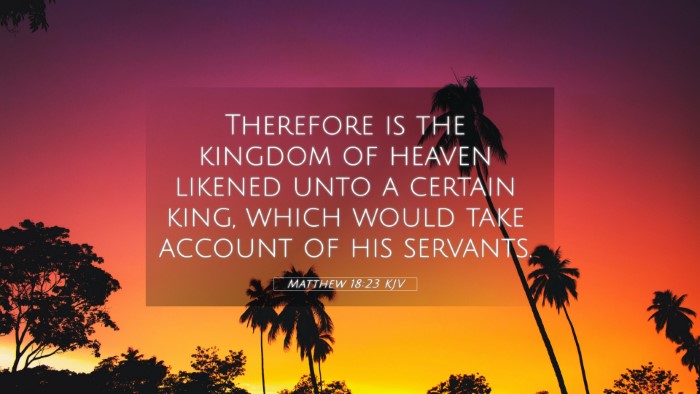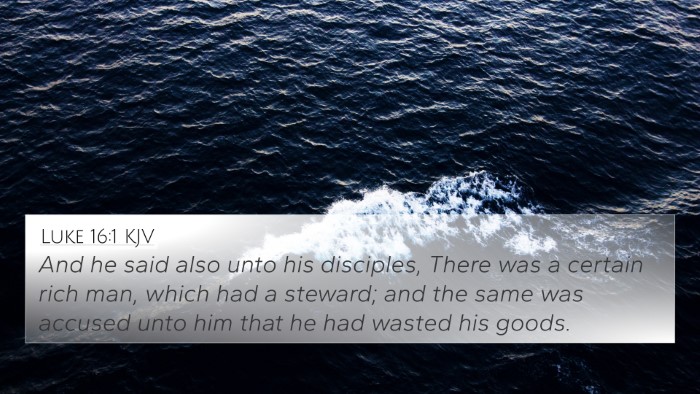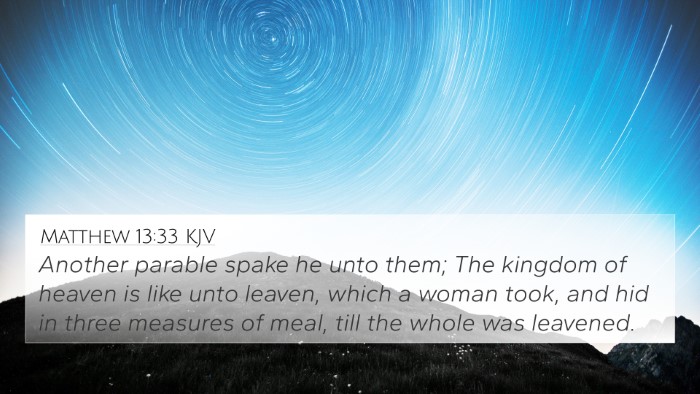Understanding Matthew 18:23
Matthew 18:23 states: "Therefore is the kingdom of heaven likened unto a certain king, which would take account of his servants."
This verse sets the stage for a parable that illustrates themes of forgiveness, mercy, and the inherent responsibility present in relationships between individuals and God.
In public domain commentaries, the verse is interpreted as indicating the accountability that exists within God's kingdom. The king represents God, and the act of taking account symbolizes God's assessment of our deeds.
Insights from Commentaries
-
Matthew Henry notes that this parable addresses not just the importance of forgiveness but also the discipline that follows when one fails to forgive. The king’s accountability mirrors God's in relation to our actions with others.
-
Albert Barnes emphasizes the king’s authority. It serves to illustrate God’s sovereignty and the inevitable reckoning that awaits individuals in their spiritual journey, encouraging self-reflection and repentance.
-
Adam Clarke connects this parable to the nature of divine justice. He explains that just as the king calls his servants for a reckoning, believers will ultimately be called to account for their actions, particularly regarding how they treat others.
Key Themes in Matthew 18:23
- Accountability: The necessity of taking stock of our actions is paramount. This reflects God’s expectation that we live righteously and in accordance with His commandments.
- Forgiveness: The upcoming lessons in the parable highlight the challenge of forgiveness, prompting readers to consider their own struggles in forgiving others, especially in light of God’s forgiveness towards them.
- God’s Authority: The image of a king in this verse underscores the theme of divine authority within the narrative, portraying God’s ultimate control over judgment and mercy.
Cross References Related to Matthew 18:23
- Luke 12:48: "For unto whomsoever much is given, of him shall be much required." This parallels the expectation of accountability for the gifts and responsibilities given to us.
- Romans 14:12: "So then every one of us shall give account of himself to God." This emphasizes the accountability we all have in the sight of God.
- James 2:13: "For he shall have judgment without mercy, that hath shewed no mercy; and mercy rejoiceth against judgment." This reinforces the mercy theme prior to eventual judgment.
- Matthew 7:2: "For with what judgment ye judge, ye shall be judged." This verse aligns with the idea that our treatment of others impacts God's judgment towards us.
- Ephesians 4:32: "And be ye kind one to another, tenderhearted, forgiving one another, even as God for Christ's sake hath forgiven you." This verse articulates the essence of granting forgiveness.
- Colossians 3:13: "Forbearing one another, and forgiving one another, if any man have a quarrel against any: even as Christ forgave you, so also do ye." This further emphasizes the theme of mutual forgiveness.
- 2 Corinthians 5:10: "For we must all appear before the judgment seat of Christ." This stresses the reality of standing before God’s judgment as implied in the parable.
- Matthew 6:12: "And forgive us our debts, as we forgive our debtors." This verse from the Lord’s Prayer asks for forgiveness but ties it to our ability to forgive others.
- Psalms 130:3-4: "If thou, Lord, shouldest mark iniquities, O Lord, who shall stand? But there is forgiveness with thee." This portrays the divine juxtaposition of justice and mercy.
- 1 Peter 4:5: "Who shall give account to him that is ready to judge the quick and the dead." This reflects the reality of divine accountability, resonating with the call for reckoning in Matthew 18:23.
Theological Reflections
When considering Matthew 18:23 as part of the larger biblical narrative, it reveals profound truths about the nature of God's kingdom. Connecting this verse to others, one realizes the pattern emerges: accountability leads not only to repentance but to an understanding of grace. Implementing tools for Bible cross-referencing such as a concordance or a cross-reference guide can be beneficial in unearthing these inter-Biblical dialogues.
Making Connections Through Cross-Referencing
By understanding Matthew 18:23 through cross-referencing, believers can gain a deeper insight into the intent behind the teachings of Jesus. Thematic Bible verse connections illuminate the common threads throughout Scripture that advocate for mercy and forgiveness.
Engaging in a comparative Bible verse analysis not only enchants the reader with its narrative beauty but also serves as a reminder of the moral obligations one bears towards the broader community of believers.
Practical Applications for Today
As believers reflect on Matthew 18:23, there emerge several practical implications:
- Encourage Forgiveness: Strive to cultivate an environment where forgiveness is prevalent, mirroring the grace that God bestows upon us.
- Self-Examination: Regularly engage in self-reflection and assessment to ensure that one’s actions align with God’s teachings.
- Promote Accountability: Foster relationships built on accountability and mutual support in spiritual growth.
- Utilize Study Tools: Leverage Bible reference resources to engage more deeply with scripture and enhance one's understanding of its interconnectedness.
Conclusion
Matthew 18:23 serves as a reminder of the tone of God's kingdom, where mercy and accountability coalesce. By examining the connections between Bible verses, we unveil a rich tapestry of divine instruction that forms the foundation of our spiritual maturity. Through the lens of cross-references and thematic explorations, we nurture a robust faith that honors the teachings of Christ and promotes a life of grace and compassion toward others.

















